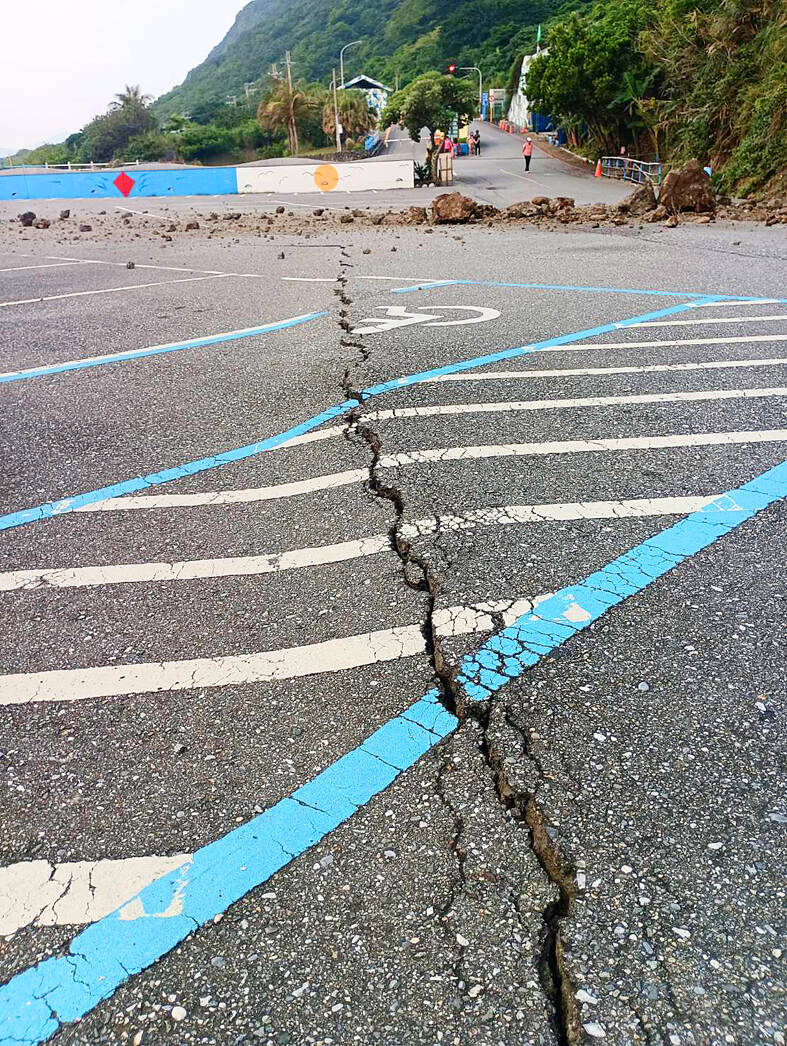A series of earthquakes over the past few days were likely aftershocks of the April 3 earthquake in Hualien County, with further aftershocks to be expected for up to a year, the Central Weather Administration (CWA) said yesterday.
Based on the nation’s experience after the quake on Sept. 21, 1999, more aftershocks are possible over the next six months to a year, the agency said.
A total of 103 earthquakes of magnitude 4 on the local magnitude scale or higher hit Hualien County from 5:08pm on Monday to 10:27am yesterday, with 27 of them exceeding magnitude 5. They included two, of magnitude 6 and 6.3, which struck at 2:26am and 2:32am yesterday.

Photo: CNA
The aftershocks have primarily been in northern Hualien County, but have progressively moved southward to include Shoufeng (壽豐) and Fenglin (鳳林) townships, Seismological Center Director Wu Chien-fu (吳健富) said.
Aftershocks of a significant earthquake tend to dissipate over time, but there would be sudden spikes due to stress adjustments, Wu said, adding that the agency is not ruling out another large earthquake, although it would be unlikely to be magnitude 7 or higher.
The aftershocks were felt more strongly over the past two days than in the previous two weeks, because they were shallow and their epicenters further inland, he said.

Photo courtesy of the Fengbin Township Office via CNA
Commenting on the extremely shallow earthquakes, some as shallow as 1.5km, Wu said this could be due to statistical error or the region’s unique geology.
The agency also advised the public to avoid visiting mountainous regions due to expected aftershocks and rainfall from a series of weather fronts.
National Central University Graduate Institute of Applied Geology professor Lee Chyi-tyi (李錫堤) said the frequent aftershocks were due to stress adjustments after the April 3 quake, adding that the public should not be too worried.
Lee said that similar earthquakes could occur and that if they did, it could see Taipei shake for longer than three minutes.
Taipei shook for one-and-a-half minutes in the 1999 earthquake.
Design response reports for buildings that are at least 50m tall or 15 floors were compiled after 1999, Lee said, adding that the results showed that these buildings in the Taipei basin could withstand such major earthquakes.
After yesterday morning’s quakes, a defunct two-story factory and a residential building in Hualien County that had been marked as structurally unsafe each partially collapsed, but no one was injured.
The factory on Ziqiang Road in Jian Township (吉安) was vacant, Hualien County Economic Affairs Department Director Teng Zeu-yu (鄧子榆) said.
It had been assessed as structurally unsafe following the April 3 quake, and when its first floor collapsed yesterday, it damaged two adjacent buildings housing a steak restaurant and warehouse, he said.
The factory would soon be torn down and its water and power supplies cut, and officials would assess whether to demolish the two other affected buildings, Teng said.
Two floors of the residential building in Shoufeng Township collapsed during yesterday’s quakes.
The quakes have so far left four buildings, including the Full Hotel on Zhongshan Road and the Tong Shuai building, partially collapsed or tilted, the Hualien County Government said.
Full Hotel had been undergoing a renovation while the unoccupied Tong Shuai building was already marked for demolition following the April 3 quake.
The county plans to demolish both buildings to prevent the risk of further collapse, Teng said, adding that it would take two weeks to demolish the two buildings.

The combined effect of the monsoon, the outer rim of Typhoon Fengshen and a low-pressure system is expected to bring significant rainfall this week to various parts of the nation, the Central Weather Administration (CWA) said. The heaviest rain is expected to occur today and tomorrow, with torrential rain expected in Keelung’s north coast, Yilan and the mountainous regions of Taipei and New Taipei City, the CWA said. Rivers could rise rapidly, and residents should stay away from riverbanks and avoid going to the mountains or engaging in water activities, it said. Scattered showers are expected today in central and

COOPERATION: Taiwan is aligning closely with US strategic objectives on various matters, including China’s rare earths restrictions, the Ministry of Foreign Affairs said Taiwan could deal with China’s tightened export controls on rare earth metals by turning to “urban mining,” a researcher said yesterday. Rare earth metals, which are used in semiconductors and other electronic components, could be recovered from industrial or electronic waste to reduce reliance on imports, National Cheng Kung University Department of Resources Engineering professor Lee Cheng-han (李政翰) said. Despite their name, rare earth elements are not actually rare — their abundance in the Earth’s crust is relatively high, but they are dispersed, making extraction and refining energy-intensive and environmentally damaging, he said, adding that many countries have opted to

SUPPLY CHAIN: Taiwan’s advantages in the drone industry include rapid production capacity that is independent of Chinese-made parts, the economic ministry said The Executive Yuan yesterday approved plans to invest NT$44.2 billion (US$1.44 billion) into domestic production of uncrewed aerial vehicles over the next six years, bringing Taiwan’s output value to more than NT$40 billion by 2030 and making the nation Asia’s democratic hub for the drone supply chain. The proposed budget has NT$33.8 billion in new allocations and NT$10.43 billion in existing funds, the Ministry of Economic Affairs said. Under the new development program, the public sector would purchase nearly 100,000 drones, of which 50,898 would be for civil and government use, while 48,750 would be for national defense, it said. The Ministry of

UNITED: The other candidates congratulated Cheng on her win, saying they hoped the new chair could bring the party to victory in the elections next year and in 2028 Former Chinese Nationalist Party (KMT) lawmaker Cheng Li-wun (鄭麗文) yesterday won the party’s chair election with 65,122 votes, or 50.15 percent of the votes. It was the first time Cheng, 55, ran for the top KMT post, and she is the second woman to hold the post of chair, following Hung Hsiu-chu (洪秀柱), who served from 2016 to 2017. Cheng is to succeed incumbent Eric Chu (朱立倫) on Nov. 1 for a four-year term. Cheng said she has spoken with the other five candidates and pledged to maintain party unity, adding that the party would aim to win the elections next year and